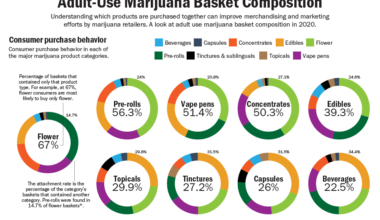[ad_1]
(This story appears in the March issue of Marijuana Business Magazine.)
The U.S. Postal Service will be prohibited from shipping vaping products starting this summer because of a new law that has cannabis businesses worried.
In late December, when Congress approved an appropriations bill to keep the government running, lawmakers included the text of a separate measure.
The “Preventing Online Sales of E-Cigarettes to Children Act” prohibits the USPS from shipping vaping products.
There’s no mention of hemp or marijuana in the new law, but businesses in both sectors should be prepared to comply, said Rod Kight, a cannabis attorney in Asheville, North Carolina.
“To the extent that they are participants in the industry who are selling vape products, it absolutely affects them,” Kight said of companies that manufacture or sell cannabis vaping supplies.
The legislation takes effect in late March, after which the USPS has 120 days to create rules to implement the law.
FedEx and UPS already have said they will follow the U.S. Postal Service’s directive and won’t ship vaping products.
“Effective April 5, 2021, UPS will not transport vaping products to, from or within the United States due to the increased complexity to ship those products,” Matthew O’Connor, a UPS spokesman, said in a statement.
Becoming Compliant
Currently, there is no publicly available information about how often vaping products are shipped in the mail. However, U.S. consumers ordered $44 million in CBD vape cartridges online in 2020, providing some measure of how often mail carriers might be used to fulfill orders, according to Rick Maturo, associate client director for the Nielsen Cannabis Insights Practice.
Under the new regulations, sellers of vaping products must do the following:
- Ship through private companies, such as DHL, which requires a signature upon delivery.
- Register with the U.S. attorney general.
- Implement an age-verification system.
“A lot of them are doing age verification already,” Kight said. “For some, this is going to be a larger project to take on.”
Business-to-business sales—whether for wholesale distribution or manufacturing—are exempt from the USPS shipping ban, Kight said, as long as they have the necessary licenses to operate.
Arnaud Dumas de Rauly, CEO and co-founder of The Blinc Group, a New York company that develops and supplies cannabis vaping hardware, called the new restrictions “another attempt by the government to ‘demonize’ nicotine vaping.” However, he expressed confidence that lawmakers are not targeting cannabis.
“The most important concept about this part of the bill is its intent, and that is to curb nicotine vaping, not cannabis,” Dumas de Rauly said.
Time to Prepare
Since the USPS still has to issue new rules in the following months, Dumas de Rauly said there is plenty of time for the government agency to explain how the ban on shipping products will be enforced. This window, he added, “also leaves the door open for our industry to lobby USPS.”
Kight agreed that businesses should use the time before the law goes into effect to prepare for looming changes.
“The first thing (for cannabis business owners) to do is to become aware of the law and whether or not it will affect them. And if they’re a (vaporizer manufacturing) company or retailer of vaping products, this will affect them,” he said.
The new regulations update an existing law governing the taxation of cigarettes and smokeless tobacco, known as the Jenkins Act, which has been in place since 1949.
While the law is directed at nicotine products, the way the new legislation is worded casts a wide net. The term “electronic nicotine delivery system,” for example, includes any product that “delivers nicotine, flavor or any other substance to the user inhaling from the device.” It’s the “any other substance” part of that sentence that makes cannabis businesses anxious.
Updates to the act include “CBD liquids as well as vaping products that don’t contain any nicotine whatsoever,” said Gregory Conley, president of the Connecticut-based American Vaping Association. Figuring out the applicable local and state taxes in all the places a company sells products is going to be challenging, he said, and might require lawyers and consultants.
“It should be possible to modernize the tax infrastructure so that you don’t have small businesses suddenly having to get licenses and deal with 20 to 50 different state tax authorities—not to mention native tribes and local governments,” he argued.
Conley said his organization lobbied Congress to find an alternative to prohibiting shipments of vaping products through the USPS but was “met with total resistance to that idea.” His group also argued the definitions in the law were overly broad.
“The best that we can hope for is there’s going to be an opportunity to comment with the USPS—as well as engage with different state tax authorities—to determine what compliance is going to be necessary,” he said. “You need to be prepared to raise your shipping prices considerably.”
Conley said how big of an impact the new rules have will depend on how strictly they are enforced. The punishment for violating the law can include three years in prison, but Conley said a more-likely scenario is that a company faces steep fines and gets shut down.
“For nicotine vaping products, which will get the majority of the enforcement,” he said, “this is very bad.”
[ad_2]
Source link
Medical Disclaimer:
The information provided in these blog posts is intended for general informational and educational purposes only. It is not a substitute for professional medical advice, diagnosis, or treatment. Always seek the advice of your physician or other qualified healthcare provider with any questions you may have regarding a medical condition. The use of any information provided in these blog posts is solely at your own risk. The authors and the website do not recommend or endorse any specific products, treatments, or procedures mentioned. Reliance on any information in these blog posts is solely at your own discretion.







